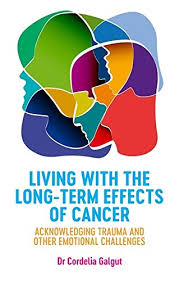
Living with the long-term effects of cancer
9 November 2020
It’s often really hard for people who have had cancer to accept, and talk about, the longer-term effects of the disease and its treatment.
In many ways this is a taboo subject - the medical profession, friends and family usually expect the person who has been treated to be ‘grateful’ about the ‘ success’ of the treatment and to return to their normal life.
Yet psychologist Cordelia Galgut points out in her book, Living with the Long-term Effects of Cancer, that life after cancer is often extremely challenging psychologically and physically.

The importance of of the ‘wild man’ archetype
18 October 2020
Many men have lost their ‘wild man’. What do I mean by this? I’m talking about the part of men that symbolises passion, wildness, strength, aggression. It is often seen as men’s darker side, but while this energy can potentially be destructive it also contains many positives.
It may seem strange to promote this idea when we see all the damage that violent or domineering men have caused in the world.
But when I’m talking about the importance of the wild man energy I’m not talking about toxic masculinity, in which men oppress or bully others, but rather a healthy connection to the internal life force that enables a man to hold boundaries, not be pushed around, give up being a people pleaser.

We won’t find the ‘right’ partner but we may find the good-enough partner
4 October 2020
One of my favourite relationship thinkers is Alain de Botton, who does a good job debunking the expectations many of us bring to our intimate relationships.
Fuelled by the messages of pop songs, romantic comedies and fiction, many of us have been conditioned to expect our partner to be a ‘soul mate’. We will not only feel completely in love with this person but they will also be our best friend, our supporter, they will understand us completely and forgive us our flaws.
Read more: We won’t find the ‘right’ partner but we may find the good-enough partner

Our need for validation
20 September 2020
We all have a need to feel validated. By this I mean that what we feel, or how we are at some deeper level, is essentially ‘okay’.
Many of us have not received that validation as children. Or maybe we received validation for certain things (eg academic achievement, being responsible) and not for others (eg being sensitive, feeling angry).

Understanding our emotions
30 August 2020
“The heart has its reasons that reason knoweth not.”
- Blaise Pascal
The quote above from French thinker Blaise Pascal describes the immense power of our emotions and how our rational self often fails to control them.
That is often what brings people into therapy. They say, “I don’t know why I’m so angry/sad/anxious - it makes no sense.” They may sometimes add, “It’s just not me!” What they mean, of course, is the emotion does not match the ‘me’ they think they are or would like to be seen as.
So, emotions are important and therapy is sometimes criticised for being too focused on them. There’s the mocking stereotype of the therapist asking his client at every opportunity - “So, how does that make you feel?”

Therapy can make you less nice
16 August 2020
"I'm discovering that therapy can make you less nice."
Anonymous client
Becoming ‘less nice’ isn’t something that most people who go into therapy expect, or are looking for. But it’s often an unexpected consequence, which brings new freedoms and possibilities.
So, what do I mean by becoming ‘less nice’? For me, it’s about a combination of things. These include becoming more aware of our feelings and therefore of what really matters to us, and by discovering our deeper desires and values we gain the courage to say ‘no’ to people whose demands don’t match our values.

Accepting our foibles
19 July 2020
“One of the most important moves in psychotherapy is to take whatever is presented and simply hold it and give it a place.”
Thomas Moore
I like the above quote because it is counter cultural, in the sense that it pushes back against the dominant message we get that problems are there to be fixed.
We go to our doctor to fix a problem and many of us start therapy with the same attitude. Of course, that is completely understandable. We are in mental pain of some kind and we want a cure - who wouldn’t?

Perfect love, imperfect relationships (book review)
5 July 2020
Perfect love, imperfect relationships is a great book on relationship psychology. It’s written by John Welwood, a psychologist and author who tried to bring together psychological and spiritual ideas.
One of the central ideas in the book is that we expect too much of our partners and are invariably disappointed when they don’t match up with our expectations. According to Welwood, this is the human condition.
It’s definitely something that resonates with me as I often find myself resentful when I don’t feel understood or valued by my partner and then it can become about trying to somehow ‘get’ them to behave in the way I want. That rarely works, of course, because people usually don’t respond well to pressure or manipulation of that kind.
Read more: Perfect love, imperfect relationships (book review)
- How we long for deeper connection
- Dealing with your inner critic
- The challenges of child-to-parent violence
- Using the language of 'parts' to communicate emotions
- 'Lowest of the low' narcissism
- Relationships can bring joy, but we also need time on our own
- Our attachment to being 'right'
- Couple therapy – making sense of emotions
- The power in therapy of ‘talking to yourself’
- Why detaching from conflict can kill a relationship


